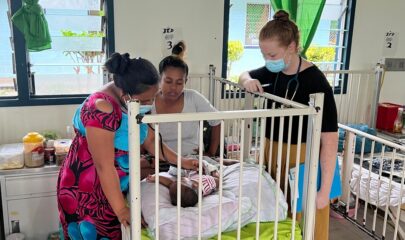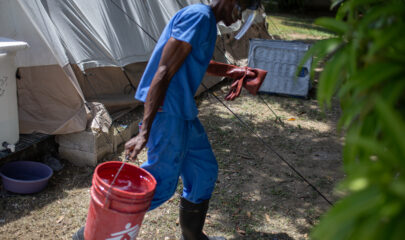DOCTORS WITHOUT BORDERS/MÉDECINS SANS FRONTIÈRES (MSF) IS A MEDICAL HUMANITARIAN MOVEMENT THAT WORKS WITH COMMUNITIES AFFECTED BY CRISES TO OFFER CARE FOR PEOPLE WHO NEED IT MOST, REGARDLESS OF RACE OR ETHNICITY.
While MSF offers medical care to people who are systematically targeted, discriminated against and excluded, we need to go further in understanding and addressing the biases and barriers that exist within our organization.
WORKING TO ADDRESS HISTORICAL IMBALANCES
“The colonial roots of the humanitarian sector, and the power imbalances that have been normalized for centuries, require us all to learn from history, question our assumptions and actively challenge the status quo,” says Christiane Essombe, Equity, Diversity and Inclusion Strategic Advisor for MSF in Canada.
Though we recruit a smaller number of staff internationally, this group has historically occupied a disproportionate number of senior management positions in the countries where MSF works. This has led to an overrepresentation of people of European descent. Our human resources staff in both recruitment and placement are working to change this, with important conversations and initiatives happening across the organization.
Among our actions to address this issue has been to design specific development packages that offer career paths and training to staff worldwide. These aim to provide people with equal opportunities to grow within the organization and take on leadership roles.
In 2019, a sixth operational centre was opened in West Africa, run mainly by senior MSF staff from the region (until then, all five of MSF’s operational centres were based in Europe) with the aim of bringing operational management and decision-making closer to the countries where we work.
“Striving for equitable power distribution, seeking a variety of lived experiences and creating practices that reflect the realities of marginalized groups,” says Essombe, “all of this is critical to fulfill MSF’s social mission.”
We are aware these actions alone are not enough, and we have a long way to go – including here in Canada.
WORKING TO EVEN THE PLAYING FIELD
MSF is applying equity, diversity and inclusion to recruitment and hiring in Canadian offices.
“We worked on a number of day-in-the-life scenarios for pathways into MSF for people who we thought would have identified as part of an underrepresented group,” says Kathy Mahinpou, People and Culture Manager for MSF in Canada.
Requests for accommodation are now invited at every stage of the hiring process. Years of experience requirements were removed from postings and replaced with job descriptions based on competencies. Written assessments are anonymized and panelists must complete interview bias training. Equity, diversity and inclusion understanding and competencies are assessed as part of interviews.
Staff participate in workshops and learning opportunities to build understanding of racism, oppression and marginalization.
“For every question there is a new pathway and a new action – we’re still pulling on that thread a year after we created the first equity, diversity and inclusion workplan,” says Mahinpou.
“While we’ve made some important and significant changes, we realize we are only getting started.”


